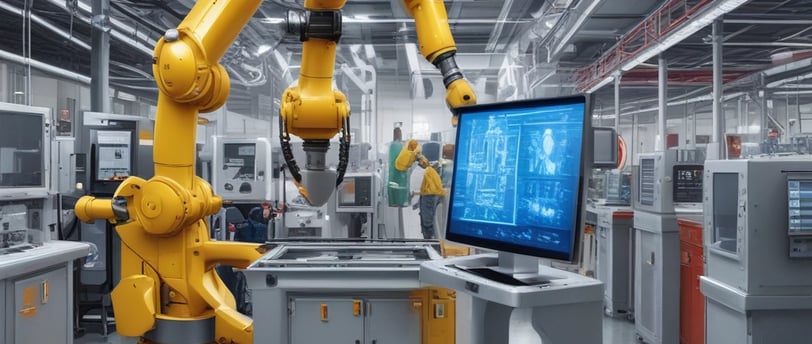AI for Predictive Quality Control: Revolutionizing Manufacturing in the USA
Discover how AI for Predictive Quality Control is revolutionizing manufacturing in the USA. Learn how artificial intelligence is enhancing product quality, reducing defects, and optimizing production processes in industries nationwide.
Anna Ryan
2/3/20253 min read


Imagine a world where defects in products are caught before they even happen. Sounds like science fiction, right? Well, thanks to AI for Predictive Quality Control, this is now a reality. In the fast-paced world of manufacturing, where precision and efficiency are everything, AI is stepping up as the ultimate game-changer. Whether you're a factory manager, a tech enthusiast, or just someone curious about the future of manufacturing, this blog will show you how AI is transforming quality control—and why it matters to you.
Let’s dive in.
What is AI for Predictive Quality Control?
AI for Predictive Quality Control uses machine learning and data analysis to anticipate and prevent quality issues before they occur. It’s like having a crystal ball for your production line, helping you spot potential problems before they turn into costly defects.
Think of it as a proactive approach to quality management. Instead of waiting for something to go wrong, AI analyzes patterns in historical and real-time data to flag potential issues. This not only enhances product consistency but also boosts customer satisfaction.
Why is this important?
It saves time and money.
It reduces waste.
It ensures higher-quality products for consumers.
How Does AI for Predictive Quality Control Work?
AI for Predictive Quality Control relies on three key technologies:
Machine Learning (ML): Algorithms learn from historical data to identify patterns that lead to defects.
Computer Vision: Cameras and sensors capture real-time images of products, which AI analyzes for imperfections.
Internet of Things (IoT): Sensors embedded in machinery collect data on performance, temperature, vibration, and more.
Together, these technologies create a system that’s constantly learning, adapting, and improving.
FAQs About AI for Predictive Quality Control
Let’s tackle some of the most common questions about this topic:
1. What industries benefit from AI for Predictive Quality Control?
Almost every manufacturing sector can benefit, but some of the biggest adopters include:
Automotive
Electronics
Pharmaceuticals
Food and beverage
Aerospace
For example, in the automotive industry, AI can predict defects in engine components, ensuring safer and more reliable vehicles.
2. How accurate is AI in predicting quality issues?
AI’s accuracy depends on the quality and quantity of data it’s trained on. With enough data, some systems can achieve 95% accuracy or higher. That’s like having a crystal ball for your production line!
3. Is AI for Predictive Quality Control expensive to implement?
While there’s an upfront cost, the long-term savings far outweigh the investment. Companies often see a 20-30% reduction in defects and a significant drop in waste. Plus, as AI technology becomes more accessible, costs are decreasing.
4. Can small businesses use AI for Predictive Quality Control?
Absolutely! Many AI solutions are scalable, meaning they can be tailored to fit the needs and budgets of smaller operations.
The Benefits of AI for Predictive Quality Control
Here’s why manufacturers in the USA are jumping on the AI bandwagon:
Cost Savings: Fewer defects mean less waste and lower costs.
Improved Efficiency: AI streamlines processes, reducing downtime.
Enhanced Customer Satisfaction: Higher-quality products lead to happier customers.
Sustainability: By reducing waste, AI helps companies meet environmental goals.
Comparing traditional quality control vs. AI-powered quality:
Aspect Traditional QC AI-Powered QC
Defect Detection Reactive (after the fact) Proactive (before it happens)
Cost High (due to waste & rework) Lower (reduced waste)
Speed Slower (manual inspections) Faster (real-time analysis)
Accuracy Prone to human error Highly accurate
Real-World Examples of AI in Action
Let’s look at some success stories:
General Electric (GE): GE uses AI to monitor jet engine production. By analyzing data from sensors, they’ve reduced defects by 25%.
Siemens: In their electronics division, AI predicts failures in circuit boards, saving millions in repair costs.
PepsiCo: AI helps ensure every bag of chips meets quality standards, reducing waste and improving consistency.
These examples show how AI isn’t just a buzzword—it’s delivering real results.
Challenges and Considerations
Of course, no technology is perfect. Here are some challenges to keep in mind:
Data Quality: AI is only as good as the data it’s trained on. Garbage in, garbage out.
Implementation Costs: While costs are dropping, initial setup can be pricey.
Workforce Training: Employees need to be trained to work alongside AI systems.
But with the right strategy, these challenges can be overcome.
The Future of AI for Predictive Quality Control
The future looks bright. As AI technology continues to evolve, we can expect even more advanced systems that are faster, smarter, and more affordable. Some trends to watch include:
Edge AI: Processing data locally on devices, reducing latency.
Explainable AI: Making AI decisions more transparent and understandable.
Integration with Robotics: Combining AI with robots for fully automated quality control.
Conclusion: Why You Should Care About AI for Predictive Quality Control
AI for Predictive Quality Control isn’t just a trend—it’s a revolution. For manufacturers in the USA, it’s a chance to stay competitive, reduce costs, and deliver better products to consumers. And for the rest of us, it means fewer defective products and a more sustainable future.
So, whether you’re a factory owner or just someone who loves tech, it’s time to embrace the power of AI. The future of manufacturing is here, and it’s smarter than ever.
What do you think about AI for Predictive Quality Control? Share your thoughts in the comments below!
AI ZENTRO
Stay updated with the latest AI innovations today.
AI ZENTRO © 2025. All rights reserved.
